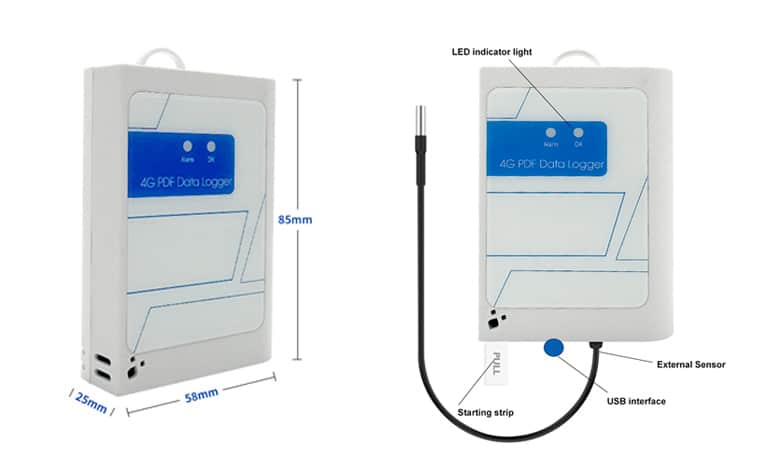Many industries utilize automated data logging technology to monitor temperature and pressure, ensuring product quality remains high. Modern farmers and ranchers also adopt this technology to monitor soil moisture, temperature, and environmental humidity, which can affect plant growth. During the livestock incubation process, data loggers are very helpful in tracking product storage and delivery.
Local governments can monitor air quality and water levels in the environment using automated data logging too. This is essential for maintaining regulatory compliance and finding solutions for better quality. Then organizations that rely on cold chain management depend heavily on data loggers to monitor routes and travel times for temperature-sensitive product shipments.
Data loggers with modern technology can operate automatically to provide accurate data, ensure high quality, simplify compliance, and support maintenance with optimal solutions. Today’s modern industries will not revert to traditional monitoring methods that are outdated and time-consuming. The modern manufacturing industry uses data loggers to monitor temperature and pressure, ensuring product safety and quality. Routine maintenance by tracking equipment health is a key aspect of automated data logging. These devices are capable of recording data from sensors and transmitters.
Contents
Technology in Automated Data Logging
Automated data logging is a high-tech product that is increasingly popular due to its practicality. With this tool, the work of personnel responsible for collecting and storing data across various industries becomes more manageable. This method is consistently more efficient for monitoring and analyzing large amounts of information in real time.
Time is very valuable for businesses, allowing them to optimize other tasks. As competition in business becomes tighter, the pace of work accelerates. Therefore, improvements in automation technology are necessary for the future. Automated data logging is an innovative technology that leverages cloud computing, artificial intelligence (AI), and machine learning. Data loggers incorporate various technologies to ensure optimal work processes.
Digital Twin Technology
This technology is easy to find in environments for work analysis, manufacturing product monitoring during operation, problem monitoring, pre-implementation testing, and monitoring the entire product life cycle.
Digital twin technology helps companies identify potential errors, monitor asset performance, understand the past, review current conditions, prevent future problems, and predict product performance.
Companies must face these challenges to make informed decisions. This technology supports the decision-making process by providing accurate data quickly.
However, digital twin technology differs significantly from AI. A digital twin is a virtual replica of a physical asset, while AI enhances this model with predictive, analytical, and automation insights. The virtual model from digital twin technology originates from a process, service, physical object, product, or system. In monitoring operations and simulating behavior, this virtual model utilizes real-time data from sensors on the object.
Artificial Intelligence and Machine Learning
Almost all sectors of society use this technology to simplify their lives in the digital realm. Automated data logging effectively utilizes artificial intelligence (AI) and machine learning (ML) to implement AI solutions. With these solutions, data loggers can analyze large data sets to identify patterns and predict potential issues.
AI in data loggers operates through algorithms and other related technologies, enabling commands to be issued to applications or machines integrated with the central network. Meanwhile, machine learning (ML) facilitates data analysis processes, including classification and predictions related to software.
Wireless Data Logger
A wireless data logger is one of the technologies in automated data logging that employs technologies like Bluetooth or Wi-Fi to collect and transmit data to a central system. Each wireless data logger features internal sensors that detect minor changes in temperature, humidity, pressure, light, and vibration. They can monitor changes over time with a wide communication range.
If using a cellular signal, the data transmission range can be extensive. However, when relying solely on Wi-Fi and Bluetooth, the range is limited to about 10 meters for Bluetooth and 100 meters for Wi-Fi.
The Benefits of Automated Data Logging Across Industries
Automated data logging brings substantial advantages across various sectors, allowing industries to save time, reduce errors, and ensure regulatory compliance. Here’s how different sectors benefit from this technology:
Enhanced Monitoring and Accuracy
Automated data logging ensures continuous, precise monitoring of environmental conditions across industries. This accuracy is crucial in food transportation, where temperature and humidity must be strictly controlled to prevent spoilage. In cold chain management, automated loggers offer unparalleled reliability, tracking real-time changes to protect product quality during transit.
Reduced Time and Labor Costs
Manual data collection is not only time-consuming but also prone to human error. Automated data loggers streamline data recording, reducing labor costs and improving accuracy. For example, in the healthcare sector, these loggers monitor equipment performance autonomously, allowing staff to focus on other critical tasks.
Predictive Maintenance and Extended Equipment Life
Modern data loggers enable predictive maintenance by tracking equipment health and performance metrics. Continuous monitoring of temperature, pressure, and vibration data provides insights into equipment wear, alerting personnel before issues escalate. According to a McKinsey report, predictive maintenance can reduce maintenance costs by 10-40% and reduce downtime by up to 50%.
Real-Time Alerts and Notifications
Automated data loggers allow users to set specific thresholds for environmental parameters. If these thresholds are breached, the system sends instant alerts, enabling rapid response to prevent damage or spoilage. For instance, in pharmaceuticals, automated data logging prevents temperature deviations that could compromise the efficacy of medications.
Data Security and Compliance
The digital nature of automated data loggers provides a secure and reliable record of compliance-related information, aiding in audits and regulatory reporting. With cloud integration, data is securely stored, tamper-proof, and easily accessible for verification. Sectors such as pharmaceuticals and food production benefit greatly from this data integrity, ensuring they meet stringent regulatory standards like FDA or HACCP.
Extended Data Recording and Analysis
Automated data loggers offer extensive recording capabilities, tracking data for days, weeks, or even years. This long-term data provides valuable insights into operational patterns, facilitating historical analysis and strategic planning. For example, in building automation, long-term data enables facility managers to assess energy efficiency and identify improvement areas over time.
Data Logger Solutions from HLY Technology Co., Ltd.
Since 2011, HLY Technology Co., Ltd. has pioneered innovative data logging products for industries that demand rigorous environmental monitoring. We offer both disposable and reusable data loggers, tailored to meet the needs of various applications. Our 4G real-time disposable data loggers are ideal for cold chain logistics, providing stable, wide-range connectivity for monitoring temperature-sensitive shipments of food, chemicals, and pharmaceuticals. For clients in need of long-term monitoring, our reusable loggers offer cost-effective solutions that ensure accurate data over extended periods.
With the option for real-time data access, our data loggers give businesses the control they need to optimize quality, maintain safety standards, and protect sensitive products. HLY’s solutions make it simple to implement automated data logging across diverse operational environments, from transportation to industrial manufacturing and environmental monitoring.

4G Real Time Disposable Temperature and Humidity Data Logger Size
Conclusion
Automated data logging is transforming industries by providing accurate, real-time monitoring that enhances quality control, ensures compliance, and supports predictive maintenance. As industries increasingly embrace digital transformation, the demand for reliable, efficient data loggers continues to grow. At HLY Technology Co., Ltd., we’re committed to delivering advanced data logging solutions that empower businesses to achieve operational excellence and safeguard their products.
For those seeking to enhance their environmental monitoring and improve product quality, data loggers offer the ultimate in flexibility and accuracy. Contact us today to explore how our automated data logging solutions can benefit your business.


